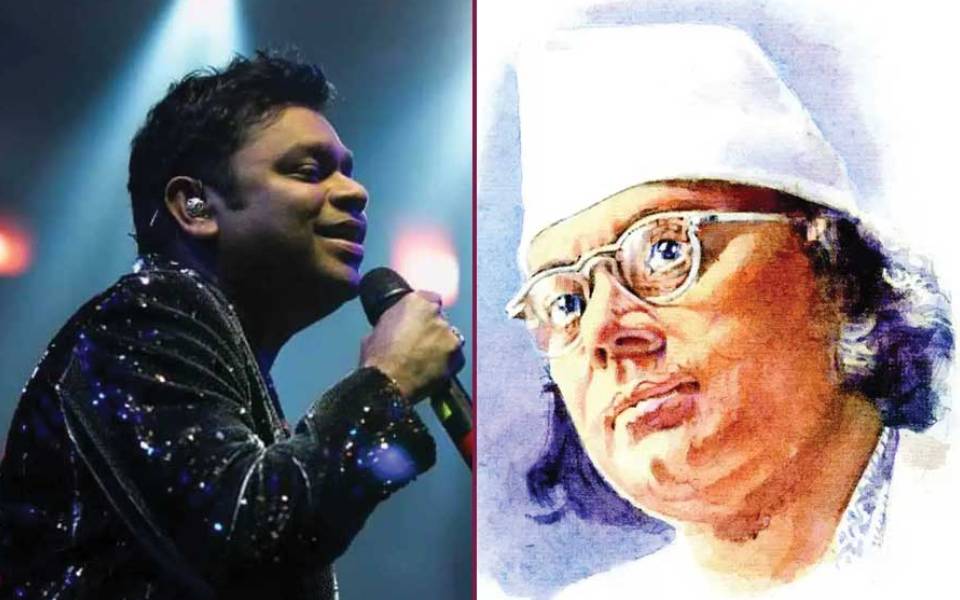Kolkata, Nov 11: A controversy has erupted over AR Rahman's rendition of a popular song of legendary Bengali poet Kazi Nazrul Islam in a new Bollywood film, with the litterateur's family and common people expressing outrage over the "distortion" in rhythm and tunes.
The rendition of 'Karar oi louho kopat' (Iron bars of a jail) was released in war movie 'Pippa', starring Ishaan Khatter and Mrunal Thakur in lead roles.
Nazrul's grandson and painter Kazi Anirban told PTI on Saturday, "My mother had given her consent for using the song for the movie but not for changing the tunes. The way the song has been dished out with the change in rhythm and tunes is shocking."
Nazrul Islam, popularly known as the 'rebel poet', is the national poet of Bangladesh and is a revered and much-loved figure in India's West Bengal.
Nazrul's granddaughter Anindita Kazi said in a voice message from the United States: "As members of his family and lovers of his creations, we cannot accept this distortion. We want it to be immediately omitted from the film and removed from the public domain."
Popular Bengali singer Haimanti Shukla said sentiments have been hurt by the "act of sacrilege".
"I wonder how a composer like AR Rahman could make this happen... No such tinkering with songs of Kazi Nazrul Islam can be allowed. It is shameful for the Bengali singers who were part of the rendition. I am deeply outraged," she said.
The lyrics of the song was first published in 'Banglar Katha' magazine in 1922 and was included in Nazrul's book of poems 'Bhangar Gaan'. It was first recorded in 1949 by a famous label and then in 1952 by another record label.
The rendition also created a social media outrage, with netizens wondering whether Rahman did research before dishing out the song.
Historian-researcher Chinmoy Guha, however, criticised the outrage, claiming that Bengalis are expressing ire despite seldom caring to read or listen to Nazrul's works.
Rahman, however, could not be contacted for remarks on the controversy.
Let the Truth be known. If you read VB and like VB, please be a VB Supporter and Help us deliver the Truth to one and all.
Hyderabad (PTI): Telangana Chief Minister A Revanth Reddy met Union Home Minister Amit Shah in Delhi on Wednesday night and urged him to increase the sanctioned strength of IPS officers to the state in view of its growing administrative and security needs.
The two leaders also discussed the recent surrender of several senior Maoist leaders before the Telangana Police and other issues.
"During the meeting, the two leaders discussed the issue of Maoist surrenders and their rehabilitation. The chief minister informed Shah that significant improvements in policing have taken place in Telangana over the past two years," an official release here said.
Highlighting that 591 Maoists have laid down their arms and joined the mainstream of society during this period, the chief minister said the state government was providing them compensation and rehabilitation assistance as per the rules.
He requested the Union home minister to extend financial support from the central government for development works in the backward regions of the state.
Reddy also urged Shah to increase the sanctioned strength of IPS officers to the state from 83 to 105 in line with the state's growing administrative and security needs, the statement said.
The first cadre review after the formation of Telangana was conducted in 2016, while the next review, due in 2021, was delayed and finally carried out in 2025. Even then, only seven additional IPS officers were allocated to the state, the chief minister informed Shah and requested that the third cadre review be conducted in 2026 as per the schedule.
Reddy explained that Telangana, like the rest of the country, is facing several modern challenges, including cybercrime, drug trafficking, white-collar crimes, and other emerging security threats.
He highlighted the reorganisation of the Hyderabad, Cyberabad, and Malkajgiri Police Commissionerates, the proposed formation of the Future City Commissionerate and the rapidly growing population in Hyderabad to underline the increasing administrative requirements of the state.





